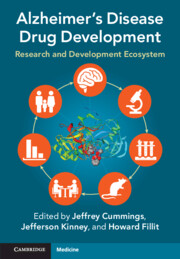Book contents
- Alzheimer’s Disease Drug Development
- Alzheimer’s Disease Drug Development
- Copyright page
- Dedication
- Contents
- Contributors
- Foreword
- Acknowledgments
- Section 1 Advancing Alzheimer’s Disease Therapies in a Collaborative Science Ecosystem
- Section 2 Non-clinical Assessment of Alzheimer’s Disease Candidate Drugs
- Section 3 Alzheimer’s Disease Clinical Trials
- 11 Phase 1 Trials in Alzheimer’s Disease Drug Development
- 12 The Importance of Phase 2 in Drug Development for Alzheimer’s Disease
- 13 Alzheimer’s Disease Drug Development in Pharmaceutical Companies
- 14 Trial Site Infrastructure and Management: Importance to Alzheimer’s Disease Drug Development
- 15 ATRI and ACTC: Academic Programs to Accelerate Alzheimer’s Disease Drug Development
- 16 The European Prevention of Alzheimer’s Disease Program: A Public–Private Partnership to Facilitate the Secondary Prevention of Alzheimer’s Disease Dementia
- 17 The Global Alzheimer’s Platform Foundation®: Delivering New Medicines Faster by Accelerating Clinical Trials
- 18 Clinical Trial Development in Frontotemporal Lobar Degeneration
- 19 Statistical Considerations in the Design and Analysis of Alzheimer’s Disease Clinical Trials
- 20 Alzheimer’s Disease Trial Recruitment and Diversifying Trial Populations
- 21 The Role of Online Registries in Accelerating Alzheimer’s Disease Drug Development
- 22 Data Safety Monitoring Boards in Alzheimer’s Disease Trials
- 23 Globalization of Alzheimer’s Disease Clinical Trials
- 24 The Use and Development of Clinical Measures of Alzheimer’s Disease Trials
- 25 Tele-Trials, Remote Monitoring, and Trial Technology for Alzheimer’s Disease Clinical Trials
- 26 Expanded Access and Compassionate Use in Alzheimer’s Disease Drug Development
- 27 The Role of the Contract Research Organization in Alzheimer’s Disease: The Vital Link in the Clinical Drug-Development Program
- 28 The Role of Regulatory Agencies in Alzheimer’s Disease Drug Development
- 29 Alzheimer’s Disease Clinical Trial Study Partners
- 30 From Trials to Practice: Are We Ready for a Disease-Modifying Treatment?
- 31 Best Practices for Clinical Trials during COVID-19
- Section 4 Imaging and Biomarker Development in Alzheimer’s Disease Drug Discovery
- Section 5 Academic Drug-Development Programs
- Section 6 Public–Private Partnerships in Alzheimer’s Disease Drug Development
- Section 7 Funding and Financing Alzheimer’s Disease Drug Development
- Index
- References
14 - Trial Site Infrastructure and Management: Importance to Alzheimer’s Disease Drug Development
from Section 3 - Alzheimer’s Disease Clinical Trials
Published online by Cambridge University Press: 03 March 2022
- Alzheimer’s Disease Drug Development
- Alzheimer’s Disease Drug Development
- Copyright page
- Dedication
- Contents
- Contributors
- Foreword
- Acknowledgments
- Section 1 Advancing Alzheimer’s Disease Therapies in a Collaborative Science Ecosystem
- Section 2 Non-clinical Assessment of Alzheimer’s Disease Candidate Drugs
- Section 3 Alzheimer’s Disease Clinical Trials
- 11 Phase 1 Trials in Alzheimer’s Disease Drug Development
- 12 The Importance of Phase 2 in Drug Development for Alzheimer’s Disease
- 13 Alzheimer’s Disease Drug Development in Pharmaceutical Companies
- 14 Trial Site Infrastructure and Management: Importance to Alzheimer’s Disease Drug Development
- 15 ATRI and ACTC: Academic Programs to Accelerate Alzheimer’s Disease Drug Development
- 16 The European Prevention of Alzheimer’s Disease Program: A Public–Private Partnership to Facilitate the Secondary Prevention of Alzheimer’s Disease Dementia
- 17 The Global Alzheimer’s Platform Foundation®: Delivering New Medicines Faster by Accelerating Clinical Trials
- 18 Clinical Trial Development in Frontotemporal Lobar Degeneration
- 19 Statistical Considerations in the Design and Analysis of Alzheimer’s Disease Clinical Trials
- 20 Alzheimer’s Disease Trial Recruitment and Diversifying Trial Populations
- 21 The Role of Online Registries in Accelerating Alzheimer’s Disease Drug Development
- 22 Data Safety Monitoring Boards in Alzheimer’s Disease Trials
- 23 Globalization of Alzheimer’s Disease Clinical Trials
- 24 The Use and Development of Clinical Measures of Alzheimer’s Disease Trials
- 25 Tele-Trials, Remote Monitoring, and Trial Technology for Alzheimer’s Disease Clinical Trials
- 26 Expanded Access and Compassionate Use in Alzheimer’s Disease Drug Development
- 27 The Role of the Contract Research Organization in Alzheimer’s Disease: The Vital Link in the Clinical Drug-Development Program
- 28 The Role of Regulatory Agencies in Alzheimer’s Disease Drug Development
- 29 Alzheimer’s Disease Clinical Trial Study Partners
- 30 From Trials to Practice: Are We Ready for a Disease-Modifying Treatment?
- 31 Best Practices for Clinical Trials during COVID-19
- Section 4 Imaging and Biomarker Development in Alzheimer’s Disease Drug Discovery
- Section 5 Academic Drug-Development Programs
- Section 6 Public–Private Partnerships in Alzheimer’s Disease Drug Development
- Section 7 Funding and Financing Alzheimer’s Disease Drug Development
- Index
- References
Summary
The path to approvability of drugs created for Alzheimer’s disease (AD) dementia, mild cognitive impairment, or associated symptoms of AD is long and expensive, involving the study sponsor, the registration authorities, a clinical research organization, and the performance site. The key to successful AD trials is the performance site, the individual investigators, the recruited subjects, and the quality of the data generated. Performance sites include academic medical centers, a division within a large multi-specialty group, and for-profit clinical trial companies. All performance sites have common elements. These include the staff (investigator, coordinator, rater/neuropsychologist, and manager), access to study participants for enrollment, appropriate training of staff, regulatory oversight (investigational review board ), and the ancillary services. Types of studies that are available include therapeutic (medication or device), longitudinal observational, and imaging. Different types of studies have different requirements for staff or infrastructure, some easy to deploy, others not. In this chapter we will describe the elements of a successful AD clinical trial site.
- Type
- Chapter
- Information
- Alzheimer's Disease Drug DevelopmentResearch and Development Ecosystem, pp. 170 - 176Publisher: Cambridge University PressPrint publication year: 2022

